Blues CD Reviews Dec 2014/Jan 2015
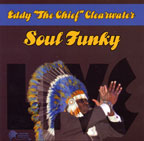 Eddy
“The Chief” Clearwater
Eddy
“The Chief” Clearwater
“Soul Funky”
Cleartone Music www.EddyClearwater.com
Starting out as a birthday party for the 79-year old blues man at the
suburban Chicago club/recording studio Space, this live wire disc might
be his best present yet, a sure fire hit. Always an exciting performer
the Chief takes charge from the start with his crack band but ups the
ante by bringing in his producer, songwriter and top blues man Ronnie
Baker Brooks to make this a real celebration. Most songs hail from Clearwater’s
vast catalog of recordings, so this really is a best of show.
Starting this party on the warpath with the thunderous intro theme “They
Call Me The Chief,” the rhythms of Stephen Bass on drums, David
Knopf’s bass and Johnny Iguana on keys drive the band’s regular
triple guitar assault of Thomas Crivellone, Shoji Naito and The Chief
himself augmented by Ronnie Baker Brooks who steps into the solo for “Hypnotized.”
Eddie harkens back to one of his early influences channeling Chuck Berry
on “Too Old To Get Married” highlighting his rock & roll
roots. Naito switches to harp for the classic Chicago blues of “Good
Times Are Coming” and the minor key cries of “Came Up The
Hard Way” before Brooks launches into his own “Root To The
Fruit” before handing it back to finish “Came Up The Hard
Way” then hitting the groove of “Cool Blues Walk.” The
only covers were the mournful “Lonesome Town” from Eddie’s
“Rock & Roll City” CD with Los Straightjackets and B.B.
King’s “Please Accept My Love.” The harp returns for
the rollicking “Find You A Job” as Naito trades off the harp
duties to Billy Branch for the classic Chicago sound of “A Good
Leavin’ Alone.” The only new tune has an intro that sounds
like Cream’s “White Room” but slams that door to get
into the chanting groove of “Soul Funky” before ending up
with intros and thank you’s in the “Ending Midnight Groove.”
Eddy Clearwater’s new CD, “Soul Funky,” sounds like
a party because it really is and with Ronnie Baker Brooks sitting in it’s
one of those rare, one-time-only shows you hope to find in a club.—Roger
& Margaret White bluestime@sbcglobal.net
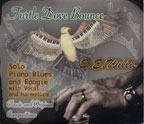 S.
E. Willis
S.
E. Willis
“Turtle Dove Bounce/ Live At The Poor House”
Mr. Suchensuch www.sewilllis.com
S. E. Willis has been a sideman supreme for forty-seven years, supporting
artists like Chuck Berry, Bo Diddly, Albert King, Jimmy Rogers, Roy Gaines
and Elvin Bishop on keyboards. Finally Willis has stepped to the forefront
with this two CD set presenting two very different sides of this artist:
“Turtle Dove Bounce” is a solo piano and harmonica project
while disc two, “Live At the Poor House,” is recorded with
a full band at San Jose’s Poor House Bistro.
What better way to introduce S.E. Willis than jumping in solo, proving
his tactile talents by burning up the piano on boogie classics like “Cow
Cow Blues,” “Vicksburg Blues,” “Pinetop’s
Boogie” and “The Fives.” He goes beyond his skill on
the ivories by interspersing the instrumentals with rich soulful vocals
covering “Worried Life,” “How Long Blues” and
“Baby Don’t You Leave Me No More.” Willis’ command
of these barrel house classics demonstrates he’s done his homework,
but it’s his originals that prove he’s the total package,
blowing some mellow harmonica on the title tune “Turtle Dove Bounce,”
“Hard Times Coming” and “Drinking Blues” and showing
his expertise with his piano romp on the “Good To Go Boogie.”
The flip side CD “Live At the Poor House” kicks out fourteen
rip-roaring classics and originals with an eight-piece band. Joining Willis,
the band is made up of past and present band mates from the Elvin Bishop
Band, featuring Bob Welsh on guitar, Ruth Davies bass, Nancy Wright on
sax, Ed Earley on trombone, Bobby Cochran beating out the rhythm on drums
and taking lead vocals on a few while towards the end of the night guitarists
Takezo Takeda and the old Red Dog himself sits in. Like any good band
leader, Willis lets each musician step to the front to shine throughout
the night. Swinging into “Rockhouse/Milk Cow Blues” they journey
into some classic “Mystery Train” before heading down to New
Orleans for “Tipitina,” “Hey Pocky A-Way” and
really “Let The Good Times Roll.” Willis goes country on “Please
Release Me” before plunging into “River’s Invitation”
with Cochran on vocals and Elvin Bishop on slide guitar. As the night
wraps up the crowd begs for more as the band has a chance to catch their
breath before hitting stride again on “32 20 Boogie” for one
of those nights music lovers strive for.—Roger & Margaret White
bluestime@sbcglobal.net
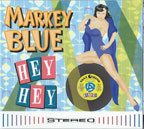 Markey
Blue
Markey
Blue
“Hey Hey”
SoulOSound Records 2014
Singer/percussionist Jeannette Markey and guitarist Ric Latina met in
2013 while performing with different bands at the same venue, and their
apparent chemistry has resulted in “Hey Hey,” a swinging debut
album project.
A soul and R&B CD, rather than a straight blues release, “Hey
Hey” comprises twelve strong songs, with composition credits to
Markey on all and Latina on many. Most of the numbers are mid-tempo,
following the opener, “When Love Comes Along” (which, while
credited to Markey and Latina, sure sounds like a famous B.B. King song).
That snappy and jaunty tune introduces Markey’s sultry and supple
voice, somewhat reminiscent of Janiva Magness’s. Adding zest
and élan to this and all the other numbers is Latina’s six-string
expertise. His guitar fills are unobtrusive but serve to propel
each tune forward, and his solos are unerringly lyrical and innovative.
Although each song is 3 to 4 minutes — no extended rave-ups or improvisations
— and tempos are similar, there’s enough variety to satisfy
and stimulate. “Feeling Blue,” for example, has a gospel
vibe, with fine organ accompaniment and nice back-up singing, provided
by Holly Steele and by Markey herself, in one of her many overdubs on
the disc. It’s followed by “Flames,” a slow R&B
cut evocative of Sly and the Family Stone from the 1970’s.
“Another Lover” provides some juicy interplay between guitar
and organ, and “With You” succeeds it with its 1950’s
pop ambience. Probably my favorite cut is “Voodoo Do,”
a funky blues with a New Orleans flavor and some sinuous Latina guitar
work. Throughout, the adept horn section of saxophone, trumpet,
and flugelhorn gooses each number forward.
By the way, why do I call this a “project” rather than an
effort by a band? Well, it’s probable that no band has four
trumpeters, four drummers, and five bass players. The promotional
blurb that I received from the album’s label calls Markey Blue a
band, but famed Memphis guitarist Steve Cropper, in his laudatory comments
on the release in the liner notes, properly calls it a project.
In that regard, it would have been nice to identify the musicians playing
on individual numbers, rather than listing them en masse at the end.
Whatever. After my cavils are over, let me say that I really like
this debut release by a group of talented musicians.— Steve Daniels
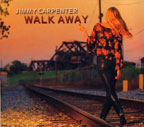 Jimmy
Carpenter
Jimmy
Carpenter
“Walk Away”
VizzTone Label Group
www.jimmycarpenter.net/”
www.jimmycarpenter.net
Jimmy Carpenter has been in the business for over twenty-five years as
a promoter, publicist and booking agent by day, playing saxophone by night.
When opportunity knocked in ‘98 Jimmy heeded that call, hitting
the road with Tinsley Ellis for an intensive year of touring. A year later
he joined Jimmy Thackery for five years and played with the hottest musicians
in blues. In 2004 Carpenter blew into New Orleans picking up session work
and quickly became the ‘go to’ guy in a town full of top musicians.
With his second release, “Walk Away,” on the VizzTone Label,
he’s written, arranged, sung, plays rhythm guitar and blows a mean
sax. His band, The New Orleans Review, are all seasoned musicians: John
Fohl on lead guitar, John “Papa” Gros on organ, Cassandra
Faulconer holds down bass, and keeping it together is drummer Wayne Maureau.
Joining on a few tunes are Michael Skinkus percussion, Antonio Gambrell
trumpet with the guitars of Mike Zito and Anson Funderburgh.
Setting things in motion, Anson Funderburgh fires off some stinging licks,
weaving around the Hammond B3 on “Can’t Let Go.” Carpenter’s
writing skills turn a potential sexist comment into a compliment as he
loves to see her “Walk Away” and Zito’s guitar leads
on “You’re Ready” play well against some tinny piano
frills. Carpenter’s sax and heartfelt vocals on “She’s
Not You” and “No One’s Ever” showcase his talents
and writing skills. “Hard To Be Cool” picks up the pace for
the Springsteen influenced “Crazy ‘Bout You” while “On
the Outside” is an energetic shake down. The band gets in the instrumental
groove on “7th Street Shuffle” as Carpenter grinds out some
mean sax on “C King Blues.” The horn led love song “More
Than Meets The Eye” is big and brassy but Jimmy’s tasty Latin
tinged “Favorite Muse” is the pièce de résistance
of this Carpenter compilation. To cool things down the country flavored
“Fellow Traveler” highlights the vocal chemistry between Jimmy
and Ms. Reba Russell; it’s both hot and sweet.
Carpenter may be known as a top sideman but “Walk Away” shows
him as a singer/songwriter and bandleader to be reckoned with. —Roger
& Margaret White bluestime@sbcglobal.net
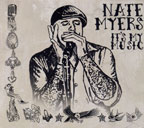 Nate
Myers
Nate
Myers
“It’s My Music”
www.natemyers.com
Nate Myers was drawn to the blues at an early age, took up harmonica and
became a disciple of those well known greats Sonny, Walter and Junior.
Honing his skills, Nate Myers and the Aces were chosen twice to represent
the Central PA Blues Society at the International Blues Challenge. Like
most, he did not prevail but took a chance to explore a new blues. Building
a base around a few cohorts, adding different players and instruments
as textures as needed. On first listen, “It’s My Music”
is hard to define. Myers’ subtle voice is reminiscent of Norton
Buffalo while his harp reminds me of both Buffalo and Jason Ricci, his
songs are based around sparse arrangements, a strong beat and Nate’s
personal journey into blues.
Starting with a throbbing bass, lilting piano and horn accents reflecting
that electrifying moment when she puts “Her Hand In Mine”
and the sultry swing of chromatic harp builds the yearning for her to
say “You Know” I love you. The tinkling intensity of piano
builds the anticipations of “Sweet Romance” if he’d
only take that chance and weathers his troubles on the slow blues of “Rainin’.”
Moving on with few classic licks from Little Walter and Billy Boy Arnold,
he’s leaving his “Porch Light” on to entice his next
Jelly Roll Queen and try a crazy new dance, the “Back Porch Swing,”
the bigger the back porch the harder the swing. The harp lets loose with
what may be a trombone echoing every note as they duet the vocal skats
“Dip Dip Wadda Dip.” Making a U-turn in style, a fiddle leads
the Appalachian promenade “Waltz For One,” a song of unrequited
love, and “Marked Man” is worn as a country badge of honor,
then turns country on its head with the country tinged rap of “It’s
My Music.” Turning to a serious side with a song of equality, “I
Believe” that the air that we breath is the same and that “Breathe”
is a harmonica and guitar excursion into the inner journey of meditation.
Not satisfied with the blues he knew, on “It’s My Music”
Nate Myers is challenging the norm with a fresh yet familiar sound. —Roger
& Margaret White bluestime@sbcglobal.net
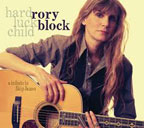 Rory
Block
Rory
Block
Hard Luck Child: A Tribute To Skip James
Stony Plain CD 1373
This is the fifth installment in lauded acoustic blues musician Rory Block’s
“Mentor Series” of solo recordings saluting various blues
masters who influenced the teenage guitarist as she hung around her father’s
hip Greenwich Village sandal shop in the 1960s. This time around it’s
blues genius Nehemiah Curtis “Skip” James, whose original
compositions have been interpreted by a coterie of contemporary artists
over the years including Cream—whose cover of “I’m So
Glad” was one of the high water marks of their 1966 debut album.
“To me, his music, with its intensity and haunting quality, was
central to the incredibly powerful style we called Country Blues,”
Block sagely comments. In addition to her own inspired rendition of James’
gospel-rooted blues classic, Block also particularly shines on her personalized
original that leads things off (“Nehemiah James”), the bleak
“Little Cow And Calf Is Gonna Die Blues,” the gritty “Hard
Time Killing Floor Blues” (another oft-covered James number), an
addictively bouncy “If You Haven’t Any Hay, Get On Down The
Road” and the ethereally chilling “Cypress Grove Blues.”
All four of Block’s earlier tribute albums, saluting fellow rediscovered
blues masters Mississippi John Hurt, Reverend Gary Davis, Mississippi
Fred McDowell and Son House, are unreservedly recommended as well. And
for even more insight into her invigorating musical passion, check out
her recently released and detail-filled autobiography, When A Woman Gets
The Blues. Holy moly! —Gary von Tersch
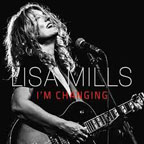 Lisa
Mills
Lisa
Mills
I’m Changing
MillsBluz C www.lisamills.com
Prior to going solo in the early-2000’s, Gulf Coast-based blues,
roots and gospel vocalist Lisa Mills toured with Big Brother & The
Holding Company—singing the songs of one of rock’s iconic
vocalists with an instinctual understanding of Janis Joplin’s captivating
balance of sensitivity and impregnability. A Mississippi native who now
resides in Mobile, Alabama, Mills’ last CD was released in 2010
(very accurately titled Tempered In Fire), winning wide acclaim for its
Lucinda Williams/Otis Redding-like, rootsy atmosphere as well as Mills’
sharp songwriting and wide-ranging vocals. As its title implies, I’m
Changing is a reconstructed, re-recorded and dramatically re-engineered
(by groundbreaking producer Trina Shoemaker) version of tracks that Mills
originally recorded and released in 2005. There are two fully re-recorded
tracks with Mills singing straight-up gospel a cappella on “Tell
Me” and particularly shining on the frank, country/soul-tinged confessional
“I Don’t Want To Be Happy.” The mix of Muscle Shoals
soul and Nashville country also reverberates on Mills’ two covers—a
bluesy, spine-tingling recall of Jimi Hendrix’s “Little Wing”
and a genuflectingly dreamlike version of Rev. Robert Wilkins’ sacred
entreaty “I Wish I Was In Heaven Sitting Down” (with guitarist
Corky Hughes playing some outstanding bottleneck resonator). Also noted
are the on-the-run love letter “I’m Changing,” a numbingly
rhythmed “Shake It” and the jamming “The Truth”—with
Hughes this time around playing electric “backwards” guitar.
Two thumbs up!—Gary von Tersch
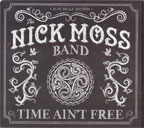 The
Nick Moss Band
The
Nick Moss Band
“Time Ain’t Free”
Blue Bella Records 2014
So, is this multiple Blues Music Award nominee a rocking bluesman or a
bluesy rock-and-roller? Which came first, the chicken or the egg?
Yes.
Lauded by such indisputable guitar greats as Buddy Guy, Ronnie Earl, and
Jimmy Thackery, Moss has earned his blues bona fides years ago, but solidifies
them with this solid new release. A blend of eclectic originals,
with only two covers, the fourteen song collection provides a generous
hour-and-a-quarter of potent music to please most blues lovers’
palates. In the process it introduces the current incarnation of
Moss’s band, completely different than his former Flip Tops.
Holding down the drum chair is Patrick Seals, abetted by Matthew Wilson
on bass and Bryan Rogers on keyboards. Notably, the mix on the entire
album is very well done, and the rhythm section can actually be heard
clearly — a quality not true of many albums — without ever
overwhelming the guitars or the integrity of each song. Backing
vocalists Tina J. Crawley and Lara Jenkins lend uplifting harmonies on
half the songs.
Probably the major revelation here is rhythm guitarist and sharing lead
vocalist Michael Ledbetter. Allegedly a descendant of Huddie Ledbetter,
the legendary 20th Century bluesman known as Lead Belly, Ledbetter trained
and performed for almost a decade as an opera singer before succumbing
to the blues addiction. His pure and soulful voice is powerful,
supple, and mesmerizing, furnishing a nice counterpoint to Moss’s
more gritty and raspy vocals.
The album rips into overdrive from the first song, “She Wants It,”
and never slows down. After just the first two songs, it’s
apparent that Moss’s guitar playing is on fire. There is variety,
as well; one of the standout tunes is “Fare Thee Well,” an
anthemic gospel-type number featuring Ledbetter’s vocal that had
me singing along after the initial verse. Seals’ prowess on
the skins is most evident on the title cut, and also the ultimate number,
“(Big Mike’s) Sweet Potato Pie,” a long instrumental
that gives each band member time to shine in the spotlight.
Of the two cover renditions, Rod Stewart and Ian McLagan’s “Bad
‘n Ruin” receives a soul treatment propelled by the piano
and organ contributions of Rogers, and Son House’s “Death
Letter Blues”…well, Son House probably wouldn’t have
recognized it, but this version, with some dazzling Moss guitar solos,
is a truly pithy electrified metamorphosis of the original.— Steve
Daniels
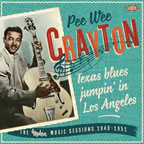 Pee
Wee Crayton
Pee
Wee Crayton
Texas Blues Jumpin’ In Los Angeles: The Modern Music Sessions 1948-1951
Ace Records CD 1400
This is the long-awaited third volume in Ace Records’ comprehensive
presentation of the ever-engaging urban blues music that pioneering West
Coast-based electric guitar pioneer Pee Wee Crayton came up with in the
late forties and early fifties. With the exception of three titles (a
smooth reprise of T-Bone Walker’s classic ballad “I’m
Still In Love With You,” a memory laden “Some Rainy Day”
and the similarly downbeat hit-capitalizing “Answer To Blues After
Hours”) the remaining 25 tracks are all previously unissued, out
and alternate takes and derive directly from the original Modern label
acetates. Hard to pick favorites here, but instrumentally (Crayton’s
appealing instrumentals are all fabulous) I particularly favor the blistering
nod to his home state “Texas Hop” as well as the scary-lively
“Austin Boogie” and his hats-off to the popular New Orleans
disc jockey “Poppa Stoppa.” Numbers with vocals, however are
plentiful (as well as authored by Pee Wee) and, often, jukebox hits back
in the day—I’ve always been fond of “Central Avenue
Blues,” “Brand New Woman” (here complete with a
cool 28-second false start) and a couple of tasty ballads: “Change
Your Way Of Lovin’” and “Thinkin’ Of You.”
Dick Shurman’s informative notes hint at a future “Volume
Four.” Hope so.—Gary von Tersch
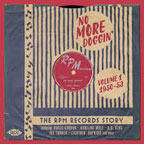 No
More Doggin’
No
More Doggin’
The RPM Records Story
Volume 1 1950-1953
Ace 2-CD 1406
As ace liners author, deep-digging archival researcher and deft compiler
Tony Rounce puts it at the outset of his booklet notes: “From a
small investment in studio time in 1944 and a 78 of a couple of piano
boogies by Hadda Brooks, Modern Records quickly grew into one of the most
important and influential rhythm and blues companies of the 40s and 50s.”
Indeed, the distinctive RPM imprint was an early Modern subsidiary and
soon settled into a steady groove, releasing mostly blues and R&B
of all sorts through to the end of 1957. Major talents whose careers really
took off under the savvy guidance of the four Bihari brothers (and occasionally
Ike Turner) include the likes of B.B. King (eight of his early sides,
often alternate takes, are here), Howling Wolf (likewise “Riding
In The Moonlight” and “I Want Your Picture”), Oakland’s
own Jimmy “T-99” Nelson and the dynamic Rosco Gordon—seven
of his finest sides are here, highlighted by the chart-topping “Booted”
from 1952, “Saddled The Cow (And Milked The Horse)” and an
insistent “No More Doggin’.” A raft of other blues performers
had briefer interludes with RPM, including Eddie Kirkland, Gene Phillips
(an alternate of his “Big Fat Mama” is here), Alex Moore,
Lightnin’ Hopkins, harmonica whiz Walter “Mumbles” Horton,
Sunny Blair, Houston Boines and King Perry—with his thrilling novelty
number “Vaccinate Me Baby”—among others. Previously
unissued performances abound. All in all, not a bum track in the bunch.
Upcoming Volume Two promises to be equally strong.—Gary von Tersch
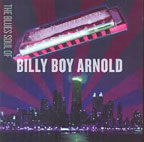 Billy
Boy Arnold
Billy
Boy Arnold
The Blues Soul Of Billy Boy Arnold
Stony Plain CD 1378
Born in Chicago in 1935, all-around veteran bluesman William “Billy
Boy” Arnold links up with versatile guitarist and producer Duke
Robillard, an all-star backing band—composed of keyboardist Bruce
Bears, acoustic/electric bassist Brad Hallen and drummer Mark Teixeira
and the dynamic Roomful of Blues horn section—for his sophomore
Stony Plain project. Inducted into the Blues Hall of Fame last year, harmonica
master Arnold remains at the top of his game on a wide-ranging set of
originals (the jiving “What’s On The Menu Mama,” the
invitational “Dance For Me Baby” and the sensual “Keep
On Rubbing”) along with eleven well-chosen covers that run the gamut
from Ted Taylor’s soulfully wailing “You Give Me Nothing To
Go On” and Nat Adderly’s jazz classic “Work Song”
to his take on the chestnut “St. James Infirmary” and an extended
revision of B.B. King’s “Worried Dream” (where Duke
really lets loose). In Robillard’s effusive liners he opines: “The
chance to work with a living legend like Billy Boy on an album full of
his favorite songs was something I jumped on without a moment’s
thought.” Job well done.—Gary von Tersch
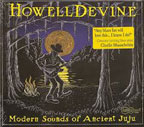 Howell
Devine
Howell
Devine
Modern Sounds Of Ancient Juju
Arhoolie CD 550
In 2013, Arhoolie Records released its first new blues record in 25 years—HowellDevine’s
critically well-received collection of Jumps, Boogies & Wobbles and
this sophomore project, fronted by San Francisco native Joshua Howell
with a rhythm section of Pete Devine and Joe Kyle Jr. in sympathetic tow
is equally accomplished. As Maria Muldaur succinctly puts it: “It’s
blues with a feeling, played simply and with an authenticity that is both
old school and refreshingly new.” Delivered in a relaxed yet rousing
style evocative of the ever-lively Mississippi juke joints that proliferated
in the 1930’s and 1940’s and inspired by the music of both
hill country stalwarts Fred McDowell and R.L. Burnside and the Delta-dipped
Chicago blues of Muddy Waters and Sonny Boy Williamson, spirited vocalist,
slide guitar maven and tasty harp player Howell and company (Devine is
a great “old time” drummer while Kyle is the only bassist
to also play with Martin Denny, Al Kooper and Pinetop Perkins) offer no-strain
covers of material not only by the fore-mentioned Waters and Williamson
(“Can’t Be Satisfied” and “She Brought Life Back
To The Dead” respectively) but also by the father of the propulsive
Memphis blues guitar style, Frank Stokes (great harp and washboard work
on “It Won’t Be Long Now”) as well as Bukka “Shake
Em On Down” White and Chess Records’ house drummer Al Duncan’s
rocking “It’s Too Late Brother.” Band originals are
highlighted by an eight minute, roaring throughout, glasses-rattling version
of an instrumental number appropriately entitled “Railroad Stomp”—recorded
live at a funky blues club in Point Richmond, California. Modern Juju
rules!—Gary von Tersch

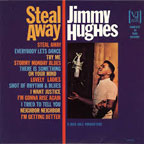 The
Animals
The
Animals
The Best Of The Animals
ABKCO LP 43241
Jimmy Hughes
Steal Away
Fame/Kent LP 021
It’s so great to see the current vinyl album revival that’s
taking place knee-deep into this new century—here’s a few
words from charismatic vocalist Eric Burdon and yours truly about a couple
of the most exhilarating reissues I’ve run across lately. Referencing
the 180 gram clear vinyl revival of the old poorly-pressed 1966 MGM LP,
The Best Of The Animals, still performing leader Burdon sagely comments
that “Best Of is a journey back to a working world that doesn’t
exist anymore. This is the way that all of those songs were meant to be
heard. I am happy to see more and more young people discover the joy of
putting on a record—and the elders rediscovering the thrill of the
needle setting down into those grooves. The Animals were a live, living
band, coming off of the road and completing an album in two days and then
going back on the road again. The moment was captured on quarter inch
tape and now it’s returned to you in its original form, 50 years
later.” Straddling the fine line between hard-edged blues and Brill
Building pop, the Animals burst out of Newcastle in 1964 onto a receptive
world wide stage with their transatlantic chart-topping smash “The
House Of The Rising Sun.” Under the deft guidance of ill-fated producer
Mickie Most they proceeded to enjoy a swath of chart hits—-including
“It’s My Life,” “Don’t Let Me Be Misunderstood,”
“We Gotta Get Out Of This Place” and “I’m Crying.”
All collected here along with stunning covers of John Lee Hooker’s
“Dimples,” Sam Cooke’s “Bring It On Home To Me”
and Chuck Berry’s “Around And Around.” As liners author
Tony Rounce notes: “Jimmy Hughes’ recording of his own song,
“Steal Away,” might not have introduced the genre, but its
riveting blend of gospel and blues made it the record that brought the
term southern soul into common parlance among fans of black American music
in 1964.” A cousin of Percy Sledge, Hughes had been recording for
a few years for Rick Hall’s Muscle Shoals-based Fame label but given
Fame’s promotional push, the single soon broke out of the South
and was on radio stations from coast to coast, picking up distribution
from Chicago’s Vee-Jay label along the way. “Steal Away”
was still climbing the charts when DJ’s and distributors began receiving
requests for an album—some of the songs chosen were R&B oldies
on the order of T-Bone Walker’s “Stormy Monday Blues,”
Big Jay McNeely’s “There Is Something on Your Mind”
and James Brown’s “Try Me” while others like “Lovely
Ladies,” “Everybody Let’s Dance” and “I’m
Gonna Rise Again” were composed by Fame’s potent songwriting
crew. Hughes never had another hit like the confessional classic and retired
from the grind in 1970 (he only sings in church now) but has the satisfaction
of knowing that his career song was at the foundation of a style that
would prevail in soul music. One of the most worthy reissues I’ve
come across lately—the blue vinyl is a nice touch.—Gary von
Tersch
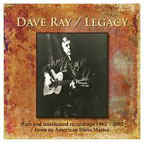 Dave
Ray
Dave
Ray
Legacy: 1962-2002
Red House CD 276
This long-awaited triple-CD project is a fascinating and deeply appealing
(particularly to those of a certain generation) career-spanning collection
of obscure and previously unreleased songs by the vastly underrated, yet
very influential (ask Bob Dylan, Bonnie Raitt or Lucinda Williams) acoustic
blues guitar master Dave “Snaker” Ray. One of the earliest
white musicians to research and perform mostly forgotten blues numbers
from the 20’s, 30’s and 40’s, Ray also played a large
role in Minneapolis, Minnesota’s colorful West Bank neighborhood’s
60’s folk and blues revival that Dylan was, famously, also a part
of. Longtime bandmate and musical collaborator Tony “Little Sun”
Glover (who put this wide-ranging opus together for Red House) comments:
“Ray and I had very similar tastes in blues, preferring the deep,
down-home numbers and we always made a point of going for the feel of
a song, trying to capture its aura rather than doing a note-for-note cover—in
fact, one of our pre-gig routines was to smoke a joint, then open a dictionary
at random and riff on the odd words we found by chance.” Along with
live recordings, studio outtakes and rarities, Legacy also includes selections
garnered from out-of-print recordings, reel-to-reel analog private tapes,
radio air-checks and old sound board mix cassettes. Disc One features
a mix of Ray’s improvisational originals (highlighted by a vintage
1963, seven-minute extravaganza titled “Hod Rod Terraplane”)
alongside classic blues covers by the likes of Lead Belly (great versions
of “Fannin Street” and “Frankie And Albert”),
Sleepy John Estes, Leroy Carr (his cautionary “Alabama Women,”
that stayed on Ray’s set list all his life), Brownie McGhee, Skip
James (an electrified, downbeat rendition of “Devil Got My Woman”),
Muddy Waters, Blind Blake and Fenton Robinson. The second disc, spanning
the years 1988 through 1994, is basically a Ray and Glover hodge-podge,
culled from the quartet of albums the duo managed to record in the fore-mentioned
eight year span when they were working pretty consistently on the club
and college circuit—covers of blues standards abound as the duo
put their unique stamp on songs by Muddy Waters, Memphis Minnie, Robert
Johnson, Yank Rachell, Jimmy Rogers, Jimmy Reed, Blind Willie McTell,
Tommy Johnson and a host of others. 21 tracks in all, including two cooking
Ray originals. The third disc contains 18 tracks, covering the years 1995
through 2002 and encompasses material that not only features the duo reuniting
with their original Elektra label bandmate, guitarist “Spider”
John Koerner, but cuts from a DIY album, A Hollow Body Experience, by
Ray’s latter-day combo 6L6 (that was only available at gigs) as
well as one of the last recordings by KR&G—Big Bill Broonzy’s
“Key To The Highway”—recorded in concert at the Toledo
Art Museum. Two tracks from Ray’s final hometown performance in
November, 2002 just two weeks before he transcended are also here and
affairs close with “If It’s Really Got To Be This Way”
from his 1997 solo release Snake Eyes. Quoting the perceptive Glover once
again, “To me Ray was a brother from another family—the family
of sound. He brought a vitality to the blues that the scholars who’d
been on the scene for years couldn’t muster.” Next issue I
plan on reviewing the three groundbreaking Elektra albums the trio of
Koerner, Ray and Glover recorded in ‘63, ‘64 and ‘65—also
available now on Red House.—Gary von Tersch
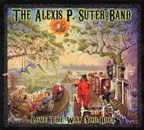 The
Alexis P. Suter Band
The
Alexis P. Suter Band
“Love The Way You Roll”
American Showplace Music
americanshowplacemusic.com
alexispsuter.com
Alexis P. Suter is a unique voice in the blues world, her sound is as
bold and audacious as any man or woman singing blues today. She has always
been billed as The Alexis P. Suter Band and on their third release, “Love
The Way You Roll,” the band has stepped in as boldly as their vocalist
and everything has crystallized into a perfect blues storm. Turbulent
and blustery, thunderous and howling, settling to a quiet storm before
blowing into a hurricane of blues fury. The guitar of Jimmy Bennett slashes
between power chords and keening slide, the rhythm section Ray Grappone
and Peter Bennett hits as hard as Alexis and the backing vocals of Vickie
Bell fills the spots left between Alexis and the guitar. The band has
been together from the start and like Alexis, grown into a force to be
reckoned with, writing all but two of the tunes; the combination is as
strong and forceful as Alexis herself.
The title cut, “Love The Way You Roll,” shows the interaction
of the band: drums rolling in like thunder, Alexis booming and rolling
across this songscape, the slide guitar howling in to dominate till Alexis
veers towards a classic “Rollin’ & Tumblin’.”
This “Big Mama” ain’t no gentle mother but a strong
woman who gets exactly what she wants, whether it’s dancing all
night or moaning the blues as the band cries “Mama” and she
sings I’m “Gonna’ Love You.” Their cover of Big
Mama Thornton’s “You Don’t Move Me No More” starts
with Alexis channeling Thornton then kicks in even bigger and bolder,
bragging with explicit lines like “I like it big and you ain’t
holding up your end of the bargain, you ain’t ready to roll me”
and invoking Willie Mae’s Hound Dog. From there Alexis says “It
Ain’t Over” till the fat lady sings, strongly adding “it
ain’t over till I say so,” showing she means business. Slowing
things down, “Waiting” has a calm presentation unless you
listen to the lyrics as Suter coolly states “you won’t know
how I feel till I smash you in the face” transforming this ballad
into a dangerous threat. “25 Years” is a blues love song,
her “baby’s sitting in the jail house” and she realizes
“I can’t raise no bail” expressing the pain and frustration
of those left outside the iron gates, then pleads she’ll do “Anything”
for her lover. The closer, Slim Harpo’s “Shake Your Hips”
is a stripped down juke joint barn burner of fiery guitar that gives the
full power of Miss Suter free reign as she says “All you gotta do
is shake your hips and your whole world will change” as Bennett
charges into a ZZ Top like boogie.
If your not hep to Alexis P. Suter yet, “Love The Way You Roll”
will make you love the way they roll.—Roger & Margaret White
bluestime@sbcglobal.net
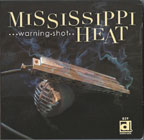 Mississippi
Heat
Mississippi
Heat
“…Warning Shot”
Delmark 2014
It is past time for this band to receive the accolades that it deserves.
With its third album for Delmark in the last five years, Mississippi Heat
delivers the goods: a lengthy set of sixteen excellent songs, all written
by harmonica ace and bandleader Pierre Lacocque and performed by an adept
ensemble whose chemistry is palpable.
Together for over fifteen years, the band is proficient in several sub-genres
of the blues. The album begins with “Sweet Poison,”
a rocking blues featuring some supple slide guitar a la Elmore James.
It’s followed by “Alley Cat Boogie,” a horn-driven boogie
(how’d you guess?) designed to bring dancers to the floor.
Risking musical whiplash, the band segues into “Come to Mama,”
a Latino-flavored mid-tempo number with fine keyboard contribution from
Neal O’Hara. Next is “I Don’t Know,” a smoothly
swinging ballad introduced by Lacocque’s lyrical harmonica and showcasing
the throaty pipes of the group’s principal singer, Inetta Visor.
We’re only four songs into the set, and have already experienced
versatility and virtuosity in equal measure.
There is not one weak song on this disc. Highlights include “Yeah
Now Baby,” another blues rocker allowing guitarist Michael Dotson
to display his vocal skills, and “Nowhere to Go,” a concise,
straight 12-bar foray simply nailed by Visor. Even exemplary drummer
Kenny Smith gets to sing on “What Cha Say?” a slow blues with
dazzling interplay between Lacocque’s harmonica and the two guitars
of Dotson and Giles Corey.
Lacocque’s “Mississippi saxophone” playing is involving
and enticing throughout without deflecting attention from each song.
Brief guest appearances by guitarist Carl Weathersby, and the tasty saxophone
stylings of Sax Gordon, are just icing on the cake. This is one
of my favorite releases of the year. Check it out. —
Steve Daniels
 Nathan
James
Nathan
James
Hear Me Calling” and “Natural Born That Way”
Self-produced 2014
If you haven’t yet heard of Nathan James, it’s time to pay
attention. For the last fifteen years, James has been the go-to
guitarist for the James Harman Band. Harman has a tradition of employing
terrific guitarists (Hollywood Fats and Kid Ramos among the best), and
in James he chose another. A busy man, James with erstwhile partner
Ben Hernandez won the International Blues Challenge in 2007 in the Solo/Duo
category. To ward off boredom, James is also the leader of
his own band, The Rhythm Scratchers, is a valued session man, is a blues
historian, and makes his own unique Washtard Gitboard instruments, rivaling
Super Chikan in instrumental construction creativity and whimsy.
This self-produced and -released double album features James in two roles.
In “Hear Me Calling,” he performs as a one-man band, playing
guitar, harmonica, and foot percussion as well as singing. Eight
of the eleven songs are originals; as James explains in the liner notes,
“I was inspired by all the great field recordings done in the 50’s
and 60’s by Alan Lomax” and similar musicologists. The
influence shows; the cuts are characterized by a rough-edged musical sophistication
and sport lyrics of homespun philosophy as well as the humor and pain
of romantic relationships. A particular favorite of mine is James’
cover of the Lonnie Johnson tune, “She’s Making Whoopee in
Hell Tonight.” It takes nerve to cover one of the great Johnson’s
tunes, but James meets the challenge impressively.
The second CD, “Natural Born That Way,” provides James with
room to stretch out on both acoustic and electric guitars, in company
with The Rhythm Scratchers. The eclectic set leads off with a rockabilly
Freddy Fender tune, “I’m Gonna Leave,” and includes
two Earl King compositions: “Take You Back Home,” sporting
a pithy guitar solo resembling a cross between Lonnie Johnson and Hollywood
Fats; and “It Must Have Been Love,” a slow 50’s-style
R&B number. “Ride with Me Baby” is a rocking 12-bar
blues penned by Long John Hunter, “I’m Gonna Tell Them”
displays the classic Bo Diddley guitar riff, and “Cow Pies,”
an instrumental, lets bass player Troy Sandow display his harmonica chops.
In addition to the versatility and virtuosity of the latter CD, its eleven
tunes are abetted by the impeccable piano contributions of Carl Sonny
Leyland, whose praise I have sung in previous reviews of his and others’
albums. An added bonus is the appearance on the second CD of four
of James’ songs from the first CD, allowing an interesting comparison
of the compositions in solo and band modes.
High quality stuff!— Steve Daniels
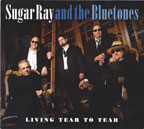 Sugar
Ray and the Bluetones
Sugar
Ray and the Bluetones
“Living Tear to Tear”
Severn 2014
Long one of the best (although under-acknowledged) U.S. blues bands, this
tight ensemble delivers a high quality set of twelve original tunes and
covers. The quartet is led by former Roomful of Blues singer Sugar
Ray Norcia, a multitalented frontman whose singing and harmonica playing
is complemented by his songwriting — he wrote half of the twelve
numbers — and production skills.
Adopting the format of many successful CDs, the album generally seesaws
between uptempo and slow numbers, beginning with the former to grab the
listener’s attention. That opening cut is a winner: “Rat
Trap” is introduced by a few bars of Norcia’s powerful harp
styling, and then blasts into orbit with an irresistible dance beat held
steady by the adept rhythm section of Michael Mudcat Ward on bass, Neil
Gouvin on drums, and Anthony Geraci on keyboards. Ward and Geraci
each contribute songs to the set list, as does guitarist Monster Mike
Welch. This basic quintet band produces a full and satisfying sound
without need for horns or frills.
Playing like an organic band, not a collection of egotistical prima donnas,
Sugar Ray and the Bluetones provide one good song after another.
Sugar Ray is in fine vocal form, alternately smooth and raspy, with nice
range and evocative emotion. His harmonica playing is exemplary;
particularly listen to him hit the high register in the extended
slow blues, “Misery,” which also features one of underrated
guitarist Welch’s best solos. Welch subsequently displays
his versatility with some propulsive skittering fills on a James Cotton-like
slow blues, “I Dreamed Last Night,” and the entire ensemble
hits a peak in the brief instrumental, “Short Ribs,” a song
evoking memories of Little Walter’s best.
Other standouts: “Our Story” is a 1950’s-style pop outing
with an interesting Hawaiian/rockabilly guitar motif and some fine crooning
and shouting by Sugar Ray; “Ninety Nine,” a Sonny Boy Williamson
II (Rice Miller) tune, allows Geraci to showcase his forte on the 88s;
appropriately, after years of touring this adept quintet, Sugar Ray adds
an ode/lament to the road with “It’s Never As Bad As It Looks.”
“Nothing but the Devil,” the ultimate number, is an insinuating
slow blues with a slyly drawled Norcia vocal that concludes this album
in style. —Steve
Daniels
 Classic
Blues Artwork From The 1920’s Calendar With CD
Classic
Blues Artwork From The 1920’s Calendar With CD
Blues Images
info@bluesimages.com
For the twelfth year in a row, esteemed record collector John Tefteller’s
Blues Images organization presents its unique calendar/CD combo—not
only can you see the original advertising artwork while listening to the
song referenced but the enclosed CD also features twelve additional super
rare and/or previously unreleased bonus cuts—the heavyweight number
this year is a recently unearthed $37,000 Tommy Johnson Paramount 78,
with “Alcohol And Jake Blues” backed with “Ridin’
Horse.” Also included are short biographies of each month’s
performer, various birth and death dates and a variety of smaller ad squibs.
The great CD cover artwork pictorializes a pseudonymous Irene Scruggs
with guitarist Blind Blake on November’s salacious “You Got
What I Want” while January features Memphis Minnie and guitarist
Kansas Joe commenting on the overwhelming flood that devastated the African-American
Mississippi Delta community in 1927 (“When The Levee Breaks”)
and May brings Blind Lemon Jefferson with his signature hit “Matchbox
Blues.” Other calendar songs showcase the likes of Willie Lofton,
Charley Patton, the Mississippi Sheiks, Roosevelt Sykes and one of the
best gospel groups ever—the justifiably Famous Blue Jay Singers
of Birmingham. Aside from the fore-mentioned Johnson sides, the bonus
tracks have the other side of the Scruggs/Blake 78 (“Cherry Hill
Blues”), another fervent number by the Blue Jay Singers, Blind Lemon
again (with an even earlier rendition of his “Matchbox Blues”),
two 1935 sides by the little known Bob Wilbur, another gem by Sykes (the
great “Little Sow Blues”) along with Papa Harvey Hull and
Long Cleve Reed lamenting “Don’t You Leave Me Here”
among others. The sound quality, throughout, is superb. It’s on
my kitchen wall.—Gary von Tersch
 Howard
Glazer
Howard
Glazer
“Looking In The Mirror”
Lazy Brothers Records
City Hall Records
www.cityhallrecords.com
wwwhowardglazer.com
Music runs in Howard Glazer’s family; father played in big bands,
mother taught music, his brother’s a classical composer and he’s
been playing almost forty years. Like most guitarists in the ‘80s
he did time in rock bands but was embraced by the black blues scene, cutting
his teeth in front of some of the toughest audiences in Detroit. The blues
has taken Glazer around the world and his European tours have even netted
him a regular blues column in the German “Wasser Prawda Magazin,”
“Blues, News & Views from Detroit.” Returning home Howard
found it was time to start “Looking In The Mirror” for those
Motor City blues again. Reconvening his regular group, Chris Brown bass,
Charles David Stuart drums, the backing vocals of Maggie McCabe and Stephanie
Johnson with Larry Marek sitting in on organ for a few tunes. Together
they’ve laid down Howard’s latest views from Detroit.
Touring can be a grind and “Broken Down Hotel Blues” is a
true story from his European tour, a droning dark side of vocals and guitar
peppered with spicy supporting vocals by McCabe and Johnson then takes
flight with hot guitar. Arriving home he pleads, “Take Me Baby”
take me all the way home, the band is rock solid as the guitar runs through
flights of fancy. The drummer hits high and hard as they go “Walking
In Detroit” and trumpeter Dave Kocbus joins their stroll. A darker
side creeps in on “Emergency” a painful look at the State-engineered
illegal take over of Detroit by the Governor’s appointed emergency
manager and the cost to its residents from a Detroiter’s point of
view. The repetitive drone like lawyers jibbering interspersed with the
wailing cries of wha wha and Tom Schmaltz’s flute as a fluttering
ray of hope while Glazer’s guitar cries facing the “Eviction
Blues.” Slide guitar lightly skips over the frets as he’s
“Feeling So Bad” but by the time he’s “Looking
In The Mirror” the slide is burning past the full band and screaming
out loud. The “Midnight Postman” delivers some hot licks and
the percussion driven “Misunderstood The Devil,” has the slide
slithers into a swampy blues. Two contrasting tunes show very different
sides, “Pushing The Limit” a rockin’ side riffing Chuck
Berry and beyond with power chords and reverb while “Wandering Trails”
provides a folk rock base for his slide.
Howard Glazer reflects on life with “Looking in the Mirror”
and for him, blues is his life.—Roger & Margaret White bluestime@sbcglobal.net
Home
/ Blues Blogs /
Artist Links / Blues Links
/ Videos / Store
Subscribe / Advertise
/ Back Issues
/ Contact / Staff